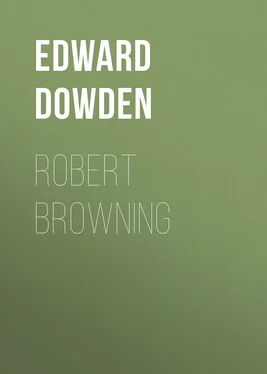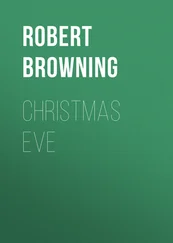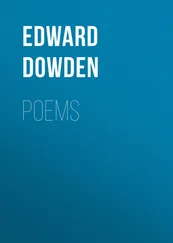Edward Dowden - Robert Browning
Здесь есть возможность читать онлайн «Edward Dowden - Robert Browning» — ознакомительный отрывок электронной книги совершенно бесплатно, а после прочтения отрывка купить полную версию. В некоторых случаях можно слушать аудио, скачать через торрент в формате fb2 и присутствует краткое содержание. Жанр: Биографии и Мемуары, Поэзия, foreign_antique, foreign_prose, foreign_poetry, на английском языке. Описание произведения, (предисловие) а так же отзывы посетителей доступны на портале библиотеки ЛибКат.
- Название:Robert Browning
- Автор:
- Жанр:
- Год:неизвестен
- ISBN:нет данных
- Рейтинг книги:5 / 5. Голосов: 1
-
Избранное:Добавить в избранное
- Отзывы:
-
Ваша оценка:
- 100
- 1
- 2
- 3
- 4
- 5
Robert Browning: краткое содержание, описание и аннотация
Предлагаем к чтению аннотацию, описание, краткое содержание или предисловие (зависит от того, что написал сам автор книги «Robert Browning»). Если вы не нашли необходимую информацию о книге — напишите в комментариях, мы постараемся отыскать её.
Robert Browning — читать онлайн ознакомительный отрывок
Ниже представлен текст книги, разбитый по страницам. Система сохранения места последней прочитанной страницы, позволяет с удобством читать онлайн бесплатно книгу «Robert Browning», без необходимости каждый раз заново искать на чём Вы остановились. Поставьте закладку, и сможете в любой момент перейти на страницу, на которой закончили чтение.
Интервал:
Закладка:
And original, in the best sense of the word—entirely true to his highest self—Browning was in the "Dramatic Lyrics" of 1842, and the "Dramatic Romances and Lyrics" of 1845. His senses were at once singularly keen and energetic, and singularly capacious of delight; his eyes were active instruments of observation, and at the same time were possessed by a kind of rapture in form—and not least in fantastic form—and a rapture still finer in the opulence and variety of colour. In these poems we are caught into what may truly be called an enthusiasm of the senses; and presently we find that the senses, good for their own sakes, are good also as inlets to the spirit. Having returned from his first visit to southern Italy, the sights and sounds, striking upon the retina and the auditory nerve, with the intensity of a new experience, still attack the eye and ear as he writes his Englishman in Italy , and by virtue of their eager obsession demand and summon forth the appropriate word. 32 32 Browning's eyes were in a remarkable degree unequal in their power of vision; one was unusually long-sighted; the other, with which he could read the most microscopic print, unusually short-sighted.
The fisherman from Amalfi pitches down his basket before us,
All trembling alive
With pink and grey jellies, your sea-fruit,
—You touch the strange lumps,
And mouths gape there, eyes open, all manner
Of horns and of humps.
Or it is the "quick rustle-down of the quail-nets," or the "whistling pelt" of the olives, when Scirocco is loose, that invades our ears. And by and by among the mountains the play of the senses expands, and the soul has its great word to utter:
God's own profound
Was above me, and round me the mountains,
And under, the sea,
And within me, my heart to bear witness
hat was and shall be.
Not less vivid is the vision of the light craft with its lateen sail outside Triest, in which Waring—the Flying Englishman—is seen "with great grass hat and kerchief black," looking up for a moment, showing his "kingly throat," till suddenly in the sunset splendour the boat veers weather-ward and goes off, as with a bound, "into the rose and golden half of the sky." And what animal-painter has given more of the leonine wrath in mane and tail and fixed wide eyes than Browning has conveyed into his lion of King Francis with three strokes of the brush? Or it is only a bee upon a sunflower on which the gazer's eye is fixed, and we get the word of Rudel:
And therefore bask the bees
On my flower's breast, as on a platform broad.
Or—a grief to booklovers!—the same eye is occupied by all the grotesquerie of insect life in the revel over that unhappy tome lurking in the plum tree's crevice of Browning's Garden Fancy , which creeps and crawls with beetle and spider, worm and eft. 33 33 See a very interesting passage on Browning's "odd liking for 'vermin'" in Letters of R.B. and E.B.B. . i. 370, 371: "I always liked all those wild creatures God ' sets up for themselves .'" "It seemed awful to watch that bee—he seemed so instantly from the teaching of God."
Or it is night and moonlight by the sandy shore, and for a moment—before love enters—all the mind of the impressionist artist lives merely in the eye:
The grey sea and the long black land;
And the yellow half-moon large and low;
And the startled little waves that leap
In fiery ringlets from their sleep
As I gain the cove with pushing prow.
If Browning did not rejoice in perfect health and animal spirits—and in the letters to Miss Barrett we hear of frequent headaches and find a reference to his pale thin face as seen in a mirror—he had certainly the imagination of perfect vitality and of those "wild joys of living," sung by the young harper David in that poem of Saul , which appeared as a fragment in the Bells and Pomegranates , and as a whole ten years later, with the awe and rapture of the spirit rising above the rapture of the senses. 34 34 Of the first part of Saul Mr Kenyon said finely that "it reminded him of Homer's shield of Achilles thrown into lyrical whirl and life" (Letters R.B. and E.B.B . i. 326).
Of these poems of 1842 and 1845 one The Pied Piper , was written in the spirit of mere play and was included in Bells and Pomegranates only to make up a number, for which the printer required more copy. One or two—the flesh and blood incarnations of the wines of France and Hungary, Claret and Tokay , are no more than clever caprices of the fancy. One, The Lost Lender , remotely suggested by the conservatism of Wordsworth's elder days, but possibly deflected by some of the feeling attributed to Pym in relation to Strafford of the drama, and certainly detached from direct personal reference to Wordsworth, expresses Browning's liberal sentiment in politics. One, the stately Artemis Prologuizes , is the sole remaining fragment of a classical drama, "Hippolytus and Aricia," composed in 1840, "much against my endeavour," wrote the poet,—a somewhat enigmatical phrase—"while in bed with a fever." A considerable number of the poems may be grouped together as expressions or demonstrations of various passions, central among which is the passion of love. A few, and these conspicuous for their masterly handling of novel themes, treat of art, and the feeling for art as seen in the painter of pictures or in the connoisseur. Nor is the interpretation of religious emotion—though in a phase that may be called abnormal—wholly forgotten.
With every passion that expands the spirit beyond the bounds of self, Browning, as the dramas have made evident to us, is in cordial sympathy. The reckless loyalty, with its animal spirits and its dash of grief, the bitterer because grief must be dismissed, of the Cavalier Tunes , is true to England and to the time in its heartiness and gallant bluffness. The leap-up of pride and joy in a boy's heart at the moment of death in his Emperor's cause could hardly be more intensely imagined than it is in the poem of the French camp, and all is made more real and vivid by the presence of that motionless figure, intent on victory and sustaining the weight of imperial anxieties, which yet cannot be quite impassive in presence of a death so devoted. And side by side with this poem of generous enthusiasm is placed the poem of passion reduced to its extreme of meanness, its most contracted form of petty spite and base envy—the Soliloquy in a Spanish Cloister ; a grotesque insect, spitting ineffectual poison, is placed under the magnifying-glass of the comic spirit, and is discovered to be—a brother in religion! A noble hatred, transcending personal considerations, mingles with a noble and solemn love—the passion of country—in the Italian exile's record of his escape from Austrian pursuers; with the clear-obscure of his patriotic melancholy mingles the proud recollection of the Italian woman who was his saviour, over whose conjectured happiness as peasant wife and peasant mother the exile bows with a tender joy. The examples of abnormal passion are two—that of the amorous homicide who would set on one perfect moment the seal of eternity, in Porphyria's Lover , and that of the other occupier of the mad-house cells, Johannes Agricola, whose passion of religion is pushed to the extreme of a mystical antinomianism.
Browning's poems of the love of man and woman are seldom a simple lyrical cry, but they are not on this account the less true in their presentment of that curious masquer and disguiser—Love. When love takes possession of a nature which is complex, affluents and tributaries from many and various faculties run into the main stream. With Browning the passion is indeed a regal power, but intellect, imagination, fancy are its office-bearers for a time; then in a moment it resumes all authority into its own hands, resolves of a sudden all that is complex into the singleness of joy or pain, fuses all that is manifold into the unity of its own life and being. His dramatic method requires that each single faculty should be seen in the environment of a character, and that its operations should be clothed more or less in circumstance. And since love has its ingenuities, its fine-spun and far-flung threads of association, its occult symbolisms, Browning knows how to press into the service of the central emotion objects and incidents and imagery which may seem remote or curious or fantastic or trivial or even grotesque. In Rudel to the Lady of Tripoli love which cometh by the hearing of the ear (for Rudel is a sun-worshipper who has never seen his sun) is a pure imaginative devotion to the ideal. In Count Gismond love is the deliverer; the motive of the poem is essentially that of the Perseus and Andromeda myth refined upon and mediaevalised. In Cristine love is the interpreter of life; a moment of high passion explains, and explains away, all else that would obscure the vision of what is best and most real in this our world and in the worlds that are yet unattained. From a few lines written to illustrate a Venetian picture by Maclise In a Gondola was evolved. If Browning was not entirely accurate in his topography of Venice, he certainly did not fail in his sense of the depth and opulence of its colour. Here the abandonment to passion is relieved by the quaint ingenuities and fancies of love that seeks a momentary refuge from its own excess, and then returns more eagerly upon itself; and the shadow of death is ever at hand, but like the shadows of a Venetian painter it glows with colour.
Читать дальшеИнтервал:
Закладка:
Похожие книги на «Robert Browning»
Представляем Вашему вниманию похожие книги на «Robert Browning» списком для выбора. Мы отобрали схожую по названию и смыслу литературу в надежде предоставить читателям больше вариантов отыскать новые, интересные, ещё непрочитанные произведения.
Обсуждение, отзывы о книге «Robert Browning» и просто собственные мнения читателей. Оставьте ваши комментарии, напишите, что Вы думаете о произведении, его смысле или главных героях. Укажите что конкретно понравилось, а что нет, и почему Вы так считаете.












